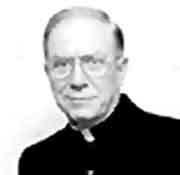 | Father Richard James Cleary was born and reared in Wichita. After graduation from Cathedral High School in 1947, he attended the seminary operated by the Benedictine monks of Conception Abbey in Northwestern Missouri. There he came to appreciate the life of the monks and, having obtained the permission of Bishop Mark Carroll of Wichita, he became a monk of that monastery. After being ordained a priest in 1955, his superiors sent him to get his master’s degree at the University of Ottawa, Canada, then to study in Athens, Greece, and then in Rome, Italy, where he obtained his doctor’s degree in Theology. Finally, he spent a year of study at Harvard University. Later, Fr. Cleary was assigned to teach for many years in Rome. In 1998, he returned to Wichita, where he served in parish ministry at St. Mary’s Cathedral and at Blessed Sacrament parishes. In 2001, his abbot (superior) transferred him to Arkansas, where he served as chaplain of the Benedictine Sisters of Holy Angels Convent in Jonesboro, and helped in the parishes of northeast Arkansas. In March 2010, he was re-assigned to his monastery, Conception Abbey, Conception, in Missouri 64433. He can be contacted there at, 660-944-2877, or by email: rjcleary@juno.com. |
Religion
2006-04-01 13:20:00
What does the Bible say about capital punishment?
Question: Often at capital punishment executions, conducted under the authority of the state, religious groups hold vigils in protest of the killing, saying: “It’s against God’s law.” Isn’t this counter to what the Bible says, particularly in the Old Testament?
Answer: It is true that the Bible teaches God’s commandment: “Thou shalt not kill.” Like some other laws of God, promulgated in the Bible, this is not an absolute rule. There are a few exceptions to the law against killing a human person. For example, when the party guilty of a serious crime has been clearly identified and their responsibility has been fully determined, the state can have recourse to the death penalty, if this is the only possible way of effectively defending human lives against the unjust aggressor. Ordinarily, only the state or legally constituted government has the right to execute criminals. However, you do have the right to defend yourself, your family, your home and guests against an unwelcome intruder, who seems intent on causing you physical harm, even if this means that you have to kill the intruder to save your own life and the lives of your family and guests.Certain crimes are so enormous that the guilty perpetrator seems to have forfeited his/her own right to life. Among such crimes are: wilful murder, hijacking an airplane, indiscriminate bombing of innocent civilians, assassination of a leader and other crimes which disturb the good order of society. In our times, the state has various possibilities for effectively preventing crime, by rendering a criminal incapable of doing harm, e.g. life imprisonment at hard labor. This allows the apparently incorrigible prisoner the possibility of redeeming himself and becoming a useful member of the human community even in prison. Thus “the cases, in which the execution of the offender is an absolute necessity, are very rare, if not practically non-existent” (cf: Catechism of the Catholic Church).Terribly tragic, in our civilization, is the barbaric crime of infanticide and murder by abortion of innocent babies. The victims are not guilty of any offense, except being inconvenient to their mother. Those persons, who perform abortions, are really guilty of violating God’s commandment “Thou shalt not kill.” And, unless they repent of those crimes, the Justice of God requires that they suffer eternal punishment.


